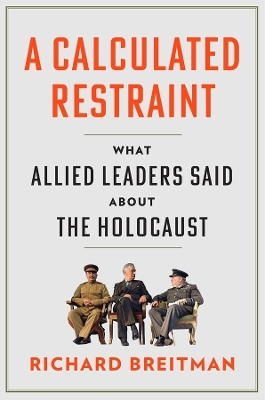
A Calculated Restraint
What Allied Leaders Said about the Holocaust
Seiten
2025
Harvard University Press (Verlag)
9780674293649 (ISBN)
Harvard University Press (Verlag)
9780674293649 (ISBN)
Why did the Allied leaders—Churchill, Roosevelt, and Stalin—largely keep quiet about the Holocaust? Richard Breitman examines the competing political and military considerations that drove their responses to Nazi mass murder, showing how and why all three leaders often prioritized wartime constraints over moral considerations.
An eminent historian of the Holocaust examines why Churchill, Roosevelt, and Stalin, though faced with mounting evidence of the Nazi extermination of Jews, were reluctant to speak out against the atrocities.
The Allied leaders rarely spoke directly about the Holocaust in public. When Churchill and Stalin alluded to Nazi mass murder of civilians in early speeches, they said much less than they knew. Not until December 1942 did Allied governments issue a joint statement about Nazi Germany’s policy of exterminating the Jews of Europe. Roosevelt deferred his own public statement until March 1944. Why didn’t these leaders speak up sooner?
Through close readings of public and private statements, Richard Breitman pieces together the competing motivations that drove each leader’s response to the atrocities. All three knew that their reactions would be politically sensitive, as Nazi propagandists frequently alleged that the Allies were fighting on behalf of Jews, and that Jews were the puppet masters behind their governments. At a time of globally prevalent antisemitism, these calumnies had force. After the German invasion of the USSR, moreover, Stalin clearly wanted to focus on the threat to the Soviet state and people. At the same time, Churchill and Roosevelt realized that complete silence would prompt accusations of willful blindness. They usually finessed this dilemma by denouncing Nazi atrocities in general, prioritizing wartime constraints over moral considerations.
Timely and incisive, A Calculated Restraint sheds new light on the relationship between World War II and the Holocaust. Ultimately, the Allied leaders’ responses cannot be reduced to a matter of character. What they said—and chose not to say—about the Holocaust must be understood in light of the political and military exigencies that drove their decision-making.
An eminent historian of the Holocaust examines why Churchill, Roosevelt, and Stalin, though faced with mounting evidence of the Nazi extermination of Jews, were reluctant to speak out against the atrocities.
The Allied leaders rarely spoke directly about the Holocaust in public. When Churchill and Stalin alluded to Nazi mass murder of civilians in early speeches, they said much less than they knew. Not until December 1942 did Allied governments issue a joint statement about Nazi Germany’s policy of exterminating the Jews of Europe. Roosevelt deferred his own public statement until March 1944. Why didn’t these leaders speak up sooner?
Through close readings of public and private statements, Richard Breitman pieces together the competing motivations that drove each leader’s response to the atrocities. All three knew that their reactions would be politically sensitive, as Nazi propagandists frequently alleged that the Allies were fighting on behalf of Jews, and that Jews were the puppet masters behind their governments. At a time of globally prevalent antisemitism, these calumnies had force. After the German invasion of the USSR, moreover, Stalin clearly wanted to focus on the threat to the Soviet state and people. At the same time, Churchill and Roosevelt realized that complete silence would prompt accusations of willful blindness. They usually finessed this dilemma by denouncing Nazi atrocities in general, prioritizing wartime constraints over moral considerations.
Timely and incisive, A Calculated Restraint sheds new light on the relationship between World War II and the Holocaust. Ultimately, the Allied leaders’ responses cannot be reduced to a matter of character. What they said—and chose not to say—about the Holocaust must be understood in light of the political and military exigencies that drove their decision-making.
Richard Breitman is Distinguished Professor Emeritus at American University. His many books include The Berlin Mission: The American Who Resisted Nazi Germany from Within; FDR and the Jews, coauthored with Allan J. Lichtman; Official Secrets: What the Nazis Planned, What the British and Americans Knew; and The Architect of Genocide: Himmler and the Final Solution.
| Erscheinungsdatum | 26.04.2025 |
|---|---|
| Zusatzinfo | 2 Maps |
| Verlagsort | Cambridge, Mass |
| Sprache | englisch |
| Maße | 140 x 210 mm |
| Gewicht | 532 g |
| Themenwelt | Geschichte ► Allgemeine Geschichte ► 1918 bis 1945 |
| Geisteswissenschaften ► Geschichte ► Regional- / Ländergeschichte | |
| Geschichte ► Teilgebiete der Geschichte ► Militärgeschichte | |
| ISBN-13 | 9780674293649 / 9780674293649 |
| Zustand | Neuware |
| Informationen gemäß Produktsicherheitsverordnung (GPSR) | |
| Haben Sie eine Frage zum Produkt? |
Mehr entdecken
aus dem Bereich
aus dem Bereich
ein Psychologe erlebt das Konzentrationslager
Buch | Hardcover (2024)
Kösel (Verlag)
CHF 30,80
Bericht aus dem Land namens Auschwitz
Buch | Hardcover (2024)
S. Fischer (Verlag)
CHF 34,95


